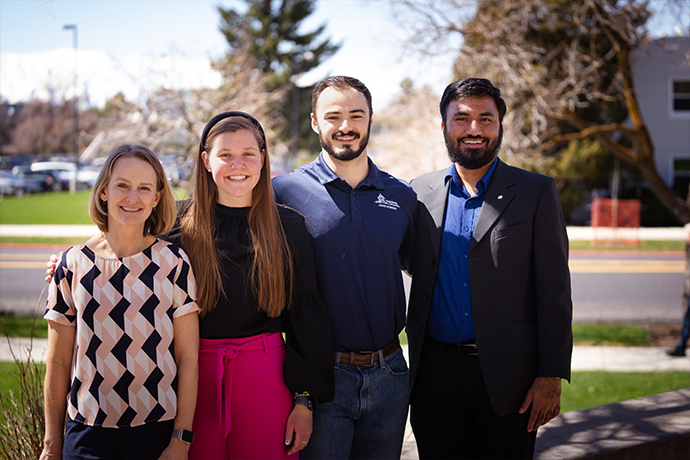The Power of Condensed Communication: The Three Minute Thesis Competition
By Madison McGrath | April 22, 2024


In academia, the ability to articulate complex research in a concise and engaging way is a coveted skill. Honing this ability is one goal of the Three-Minute Thesis Competition (3MT). An annual competition held at more than 200 universities worldwide, it is open to graduate students who are challenged to present their research in just 180 seconds, and in an engaging form that can be understood by an intelligent audience with no background in the research area.
This spring, Utah State University’s Department of Nutrition, Dietetics and Food Sciences hosted its second 3MT competition.
This exercise develops presentation, research and academic communication skills and supports the development of research students’ capacity to explain their work effectively.
"The ability to put a complicated topic into a few words that are understandable to anyone is an important and truly useful skill," said Greg Cuomo, College of Agriculture and Applied Sciences’ associate dean for research and graduate studies, and now two-time judge of the USU event.
This year's top finishers, Aubrey Jean Stout and Joseph Varre tied for first place, and Chandler Stafford, the people’s choice winner, each exemplified the essence of effective research communication.
Joseph Varre, from Hyderabad, India, is pursuing a Ph.D. in nutrition and food science. He explored the nuanced relationship between livestock farming practices and meat nutrient density. His research delves into how farming techniques impact the nutritional quality of meat, underscoring the interconnectedness of dietary choices and human health.
“Balancing complexity and clarity was a primary challenge,” Varre said. “Ensuring the research was presented in a way that was both scientifically accurate and easy to understand for a lay audience required careful consideration of language and content. Additionally, distilling years of research into a three-minute narrative without losing the essence of the study demanded significant refinement and focus on the most impactful points.”
Aubrey Jean Stout, a master's degree candidate in food science from Idaho Falls, Idaho, delved into the use of acid whey, a byproduct of dairy food production. Her research addresses the sustainability challenge posed by excess acid whey and proposing innovative methods for using it to create other valuable products, thereby benefiting both the dairy industry and the environment.
“3MT competition is a great way to develop presentation and communication skills,” Stout said. “With so little time to explain something so big, you are forced to find the most important information, and share it in a way that anyone could understand.”
Chandler Stafford, a Ph.D. candidate in food science from Centerville, Utah, explained the science behind freezing as a method to enhance meat tenderness. His research offers a pragmatic solution to improve the palatability of beef steak, showcasing the intersection of science and culinary enjoyment.
“It wasn’t easy, but I looked for the key concepts of my project and put myself in the shoes of the audience,” Stafford said. “I asked myself, ‘What would I want to know about the project if I could only get the highlights?’”
Getting ready for the 3MT competition is challenging. Participants have to balance being scientifically correct with being easy to understand, breaking down complex research questions and techniques into understandable bits without losing its core. It takes a lot to select the right points, relentless practice, and guidance from mentors and advisors.
The benefits go beyond just the academic world. The 3MT competition helps students develop skills that are useful in all sorts of situations. By learning to communicate clearly and confidently, they can connect with all kinds of people, cultivate public speaking confidence, and make an impact way beyond their field.